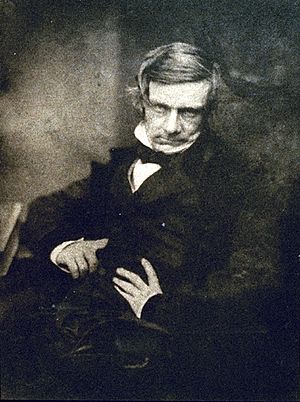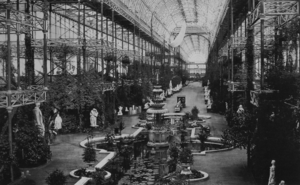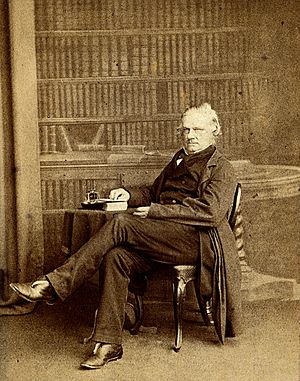Robert Gordon Latham facts for kids
Robert Gordon Latham (born March 24, 1812 – died March 9, 1888) was an English expert who studied people and their cultures (an ethnologist) and languages (a philologist). He was also a FRS, which means he was a respected member of a famous science group.
Contents
Early Life and Education
Robert Gordon Latham was born in a place called Billingborough, Lincolnshire, on March 24, 1812. His father, Thomas Latham, was a vicar there.
When he was seven years old, in 1819, Robert went to Eton College, a well-known school. Later, in 1829, he went to King's College, Cambridge, a famous university. He finished his first degree in 1832 and soon after became a Fellow of the college.
Becoming a Language Expert
Latham spent a year in Europe studying languages. He visited places like Hamburg in Germany, Copenhagen in Denmark, and Christiania (which is now Oslo) in Norway. In Norway, he met important people like Ludvig Kristensen Daa and Henrik Wergeland. He even wrote a book about Norway called Norway and the Norwegians in 1840.
In 1839, he became a professor of English language and literature at University College, London. Here, he worked with other language experts like Thomas Hewitt Key and Henry Malden. Together, they helped the Philological Society grow from a student group into a bigger group for language experts in London. They even started publishing their own papers.
His Time as a Doctor
Even though he loved languages, Latham decided to study medicine. In 1842, he became a licensed doctor from the Royal College of Physicians. He later earned a medical degree (M.D.) from the University of London.
He taught about forensic medicine (using medicine for legal cases) and materia medica (the study of medicines) at the Middlesex Hospital. In 1844, he became an assistant doctor there.
Studying People and Cultures
Latham was more interested in studying people and languages than medicine. So, in 1849, he stopped working as a doctor. In 1852, he was put in charge of the ethnology (study of people and cultures) section of The Crystal Palace. This famous building was moved to Sydenham.
Latham followed the ideas of another expert named James Cowles Prichard. They believed that studying the history of languages could help understand where different groups of people came from. Latham often gave talks on this topic.
He used a theory that divided people into three main groups. However, Latham didn't like using the word "race." Instead, he preferred to talk about "varieties of man." This was because some people were starting to believe in different ideas about human origins around 1850. In 1854, he wrote a book called The Native Races of the Russian Empire.
Latham later had different ideas from Prichard. He didn't think that the history of languages always perfectly matched the history of the groups who spoke them. In 1862, he disagreed with the idea that the Aryan race (a group of people who spoke early Indo-European languages) came from Central Asia. He thought that the Indo-European languages actually started in Lithuania. He strongly disagreed with Max Müller, another expert who supported the "Aryan theory." This disagreement caused some problems for Latham's reputation as a scholar.
Later Life
In 1863, Latham received a special payment called a civil list pension. This was a payment from the government for his contributions. Later in his life, he had trouble speaking because of a condition called aphasia. He passed away in Putney on March 9, 1888.
His Books and Works
In 1841, Latham wrote a popular textbook called The English Language. He also spent a lot of time updating Samuel Johnson's famous Dictionary of the English Language, finishing it in 1870. He also worked on a detailed study about Hamlet. His books on the English language were very important for a long time until new ones came out.
Some of his other works include:
- An Elementary English Grammar for the Use of Schools, 1843
- The Natural History of the Varieties of Mankind, 1850
- Man and his Migrations, 1851
- The Native Races of the Russian Empire, 1854
- Logic in its Application to Language, 1856
- Descriptive Ethnology, 1858
- Opuscula: Essays Chiefly Philological and Ethnographical, 1860
- A Smaller English Grammar for the Use of Schools, 1861
- The Channel Islands, 1862 (with David Thomas Ansted)
- Elements of Comparative Philology, 1862
 | Shirley Ann Jackson |
 | Garett Morgan |
 | J. Ernest Wilkins Jr. |
 | Elijah McCoy |




